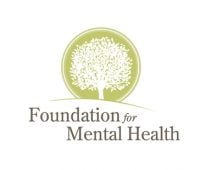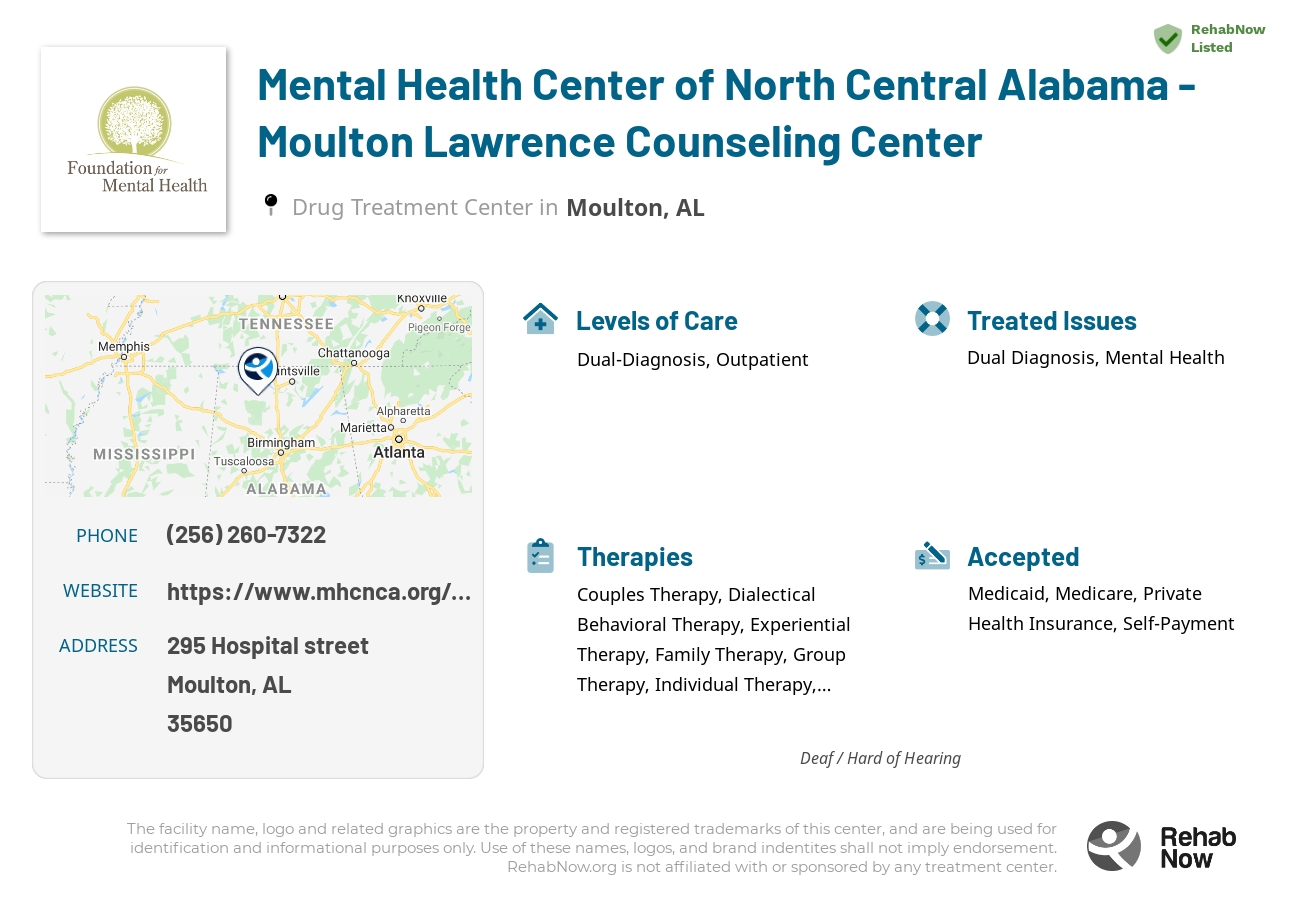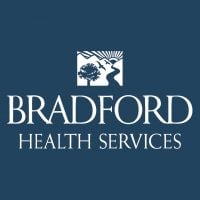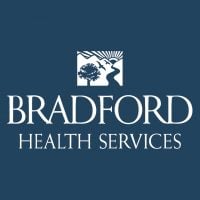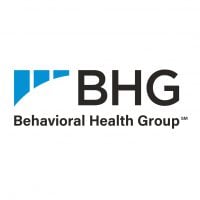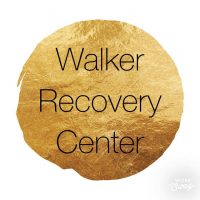Mental Health Center of North Central Alabama - Moulton Lawrence Counseling Center
Drug Rehab Center in Moulton, Alabama
The Mental Health Center of North Central Alabama-Moulton Lawrence Counseling Center is a mental health and addiction counseling center in Moulton, Alabama that offers a wide range of individual and group therapies, preventive services, recovery support services, and specialized services to meet the needs of each individual.
About Mental Health Center of North Central Alabama - Moulton Lawrence Counseling Center in Alabama
Mental Health Center of North Central Alabama-Moulton Lawrence Counseling Center in Moulton, Alabama is a mental health and addiction counseling center that has been providing quality care for individuals, family support, and community services for over 20 years. The center offers a supportive environment for individuals seeking counseling for a variety of issues, from addiction to depression. They provide access to both individual and group therapy, as well as private and family therapies. The center also offers preventive services, such as self-care classes and support groups, that are designed to promote healthy living and create a strong sense of community.
The Mental Health Center of North Central Alabama-Moulton Lawrence Counseling Center offers a wide range of services specifically designed for individuals who are struggling with addiction and substance abuse. This includes the development of personalized treatment plans, supportive and therapeutic counseling sessions, and the use of evidence-based techniques and interventions. The center also provides access to a variety of recovery support services, such as peer support groups and safe, supervised settings, to help ensure successful and lasting recovery. Additionally, the center offers holistic care that encourages healthy living and healing, including activity and recreation programs, nutrition counseling, and spiritual guidance.
The Mental Health Center of North Central Alabama-Moulton Lawrence Counseling Center is accredited by the Commission on Accreditation of Rehabilitation Facilities (CARF) and licensed by the Alabama Department of Mental Health. The center has also received the Substance Abuse and Mental Health Services Administration’s Quality Award for the last four years. Additionally, the center offers a variety of specialized services designed to meet the needs of each individual, including 24-hour emergency services, residential and outpatient programs, and special programs for teens, veterans, and the elderly. The center is committed to providing the best possible care and services to all of its clients.
Genders
Ages
Modality
Additional
Conditions and Issues Treated
Levels of Care Offered
This center offers a variety of custom treatment tailored to individual recovery. Currently available are Dual-Diagnosis, Outpatient, with additional therapies available as listed below.
“Outpatient treatment is ideal for those who have a lower intensity addiction. It’s also suitable for those with a supportive environment and those on a tight budget.
Outpatient treatment can be considered the lowest intensity level of addiction treatment. It is ideal for early phase addiction or lower intensity addictions. It may involve weekly sessions instead of daily. Peer group support, 12-step programs, and individual counseling may still be used and anti-addiction medication.
Therapies & Programs
No single treatment works for all addicts; therefore, the goal of treatment and therapy should be to find what works best for each individual. Some people requiring addiction treatment may only need a few weeks of inpatient care. Others will require long-term residential care. Tolerance and withdrawal levels vary from person to person and thus affect the intensity of the treatment needed.
If an individualized approach to treatment and therapy is not offered, addicts may fail to reap benefits from their efforts. Professionals must customize plans according to their patient’s needs, limitations, and strengths. The goal of all forms of addiction treatment should be for addicts to find healthy ways to cope with their addiction and its underlying causes.
Couples therapy for drug addiction is a unique form of therapy that allows family members to work through the emotional issues of their loved one’s addiction together. Family members can support each other while learning how to cope with the addiction and encourage healthy changes.
Accordingly, couples therapy for drug addiction is designed for an addict and their significant other or spouse. The two will work with a therapist to learn how the addiction affects themselves and the relationship and how to break the negative patterns of behavior that may have developed.
Drug addiction can destroy a person’s life, as well as their family and friends. The loss of one’s ability to choose how to live and behave often leads the addict into depression, anger, guilt, and many emotional problems.
The therapies usually include siblings, children, and parents who are involved in their daily lives. These sessions are vital because they address past issues that may have hampered an addict’s or alcoholic’s recovery and provide support at a crucial time!
One of the most critical aspects of family therapy is helping addicts’ loved ones see their situation in a new light. It’s also one of the most challenging things a family can do when a loved one struggles with addiction or alcoholism.
Group therapy is held in a safe, controlled setting where patients can feel comfortable sharing their struggles and gaining perspective through shared conversations. It takes place in a group rather than one on one to prevent feelings of isolation or being unique in their situation while creating an environment for addicts at Mental Health Center of North Central Alabama - Moulton Lawrence Counseling Center to develop fellowship, accountability, and support. Group therapy is an important tool in recovery that prevents cravings that prompt a return to active addiction.
Trauma Therapy at Mental Health Center of North Central Alabama - Moulton Lawrence Counseling Center
This type of therapy involves the use of a variety of therapeutic techniques to help addicts recover from past traumas that might have triggered their substance abuse. During these sessions, therapists will work with the addict to address painful memories and learn how to cope effectively with stressors as they arise.
During these types of sessions, therapists will typically focus on three main goals:
- Identifying and expressing painful emotions associated with past traumas.
- Reducing the effects of stress on an addict’s life by developing more effective coping mechanisms.
- Developing healthy ways of thinking about stressful situations that can help addicts avoid substance abuse issues in the future.
This type of therapy is typically used in conjunction with other types of addiction treatment services. By identifying and dealing with the root cause of addiction, most addicts can overcome their cravings and prevent relapse once they leave rehab.
Many different types of addiction treatment services exist to help addicts safely get sober, but it’s important for recovering individuals to find a therapist or support group that will help them address the root cause of their addiction.
Dialectical Behavior Therapy is a form of Cognitive Behavioral Therapy that helps patients understand the relationship between their thoughts, feelings, and behaviors. It is beneficial for those whose addictions and behaviors stem from severe mental health issues. It aims to help the patient achieve their goals and identify how they can enhance their lives.
Cognitive-behavioral therapy is a talking-based method that helps people struggling with addiction replace destructive behaviors with healthier ones. CBT also helps them identify the underlying thoughts and beliefs that cause these behaviors in the first place and ways to control those thoughts and feelings. It can be administered as a holistic therapy or as part of combination therapy and—as opposed to turning to drugs and alcohol—helps addicts learn how to respond to negative thoughts instead.
Patient Experience
Experiential Therapy at Mental Health Center of North Central Alabama - Moulton Lawrence Counseling Center
Experiential Therapy is used by drug treatment facilities to treat substance abuse. This treatment is clinically proven to help addicts in detoxification by allowing them to release emotions in a safe environment. The treatment process involves addicts painting their feelings and releasing them on a canvas.
One of the most popular forms of experiential therapy is known as LPE – Love, Peace, and Equilibrium. Amy Gumowitz developed this treatment in 1992. By implementing her philosophy of “reality therapy” into the treatment, Gumowitz’s results were outstanding. Once her success was validated by those she had been helping, she decided to open her treatment center. Although Gumowitz passed away in 2007, her contribution to the addiction recovery remains effective, and better yet, it is 100% self-sufficient.
Payment Options Accepted
For specific insurance or payment methods please contact us.
Is your insurance accepted?
Ask an expert, call (888) 674-0062
Additional Details
Specifics, location, and helpful extra information.
Moulton, Alabama 35650 Phone Number(256) 260-7322 Meta DetailsUpdated November 25, 2023
Staff Verified
Mental Health Center of North Central Alabama - Moulton Lawrence Counseling Center Patient Reviews
There are no reviews yet. Be the first one to write one.
Moulton, Alabama Addiction Information
Opioids, such as heroin, fentanyl, and prescription opioids are related to more than half of all drug-related overdoses in Alabama. Alcohol is the most frequently used substance in Alabama; 85,000 Alabamians use cocaine every single year. In Alabama, there are four times as many vehicle crashes involving alcohol as there are normal vehicle crashes.
Treatment in Nearby Cities
- Dutton, AL (78.5 mi.)
- Eutaw, AL (118.8 mi.)
- Decatur, AL (19.2 mi.)
- Wetumpka, AL (147.8 mi.)
- Childersburg, AL (99.1 mi.)
Centers near Mental Health Center of North Central Alabama - Moulton Lawrence Counseling Center
The facility name, logo and brand are the property and registered trademarks of Mental Health Center of North Central Alabama - Moulton Lawrence Counseling Center, and are being used for identification and informational purposes only. Use of these names, logos and brands shall not imply endorsement. RehabNow.org is not affiliated with or sponsored by Mental Health Center of North Central Alabama - Moulton Lawrence Counseling Center.
